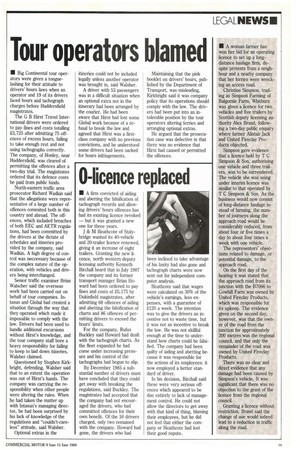0-licence replaced
Page 23

If you've noticed an error in this article please click here to report it so we can fix it.
• A firm convicted of aiding and abetting the falsification of tachograph records and allowing drivers' hours offences has had its existing licence revoked — but it was granted a new one for three years.
& M Heathcote of Stalybridge wanted its 40-vehicle and 20-trailer licence renewed, giving it an increase of eight trailers. Granting the new licence, north western deputy licensing authority Kenneth Birchall heard that in July 1987 the company and its former transport manager Brian Howard had been ordered to pay fines and costs of 25,175 by Dukinfield magistrates, after admitting 68 offences of aiding and abetting the falsification of charts and 86 offences of permitting drivers to exceed the hours' limits.
For the company, Rufus Buckley said Howard had dealt with the tachograph charts. As the fleet expanded he had come under increasing pressure and his control of the tachographs had begun to slip.
By December 1985 a substantial number of drivers must have concluded that they could get away with breaking the regulations, said Buckley. The magistrates had accepted that the company had not encouraged the drivers, who had committed offences for their own benefit. Of the 16 drivers charged, only two remained with the company. Howard had gone, the drivers who had been inclined to take advantage of his laxity had also gone and tachograph charts were now sent out for independent computer analysis.
Heathcote said that wages were calculated on 30% of the vehicle's earnings, less expenses, with a guarantee of 2120 a week. The intention was to give the drivers an incentive not to waste time, but it was not an incentive to break the law. He was not skillful enough at the time to understand how charts could be falsified. The company had been guilty of aiding and abetting because it was responsible for the actions of its employees: it now employed a better standard of driver.
In his decision, Birchall said these were very serious offences which appeared to be due entirely to lack of management control. He could not allow the directors to get away with that kind of thing, blaming their employees, but he did not feel that either the company or Heathcote had lost their good repute.
















































































































